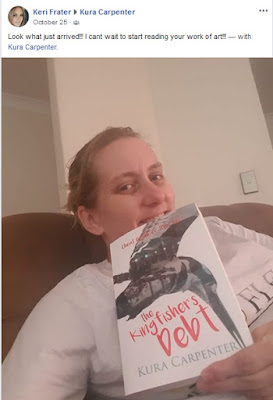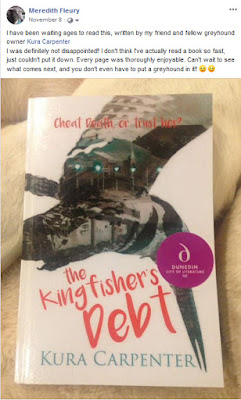I get it, books are
expensive. As much as you want to buy books, there’s bills to pay, kids to be feed, and you’d
really like a pair of sneakers without holes so you can walk your dog
through puddles without having squelchy socks afterwards – or is
that just me?
So you might have found yourself asking:
How can I support local authors for free?
Good
news, there is a number of easy ways that you can help your favourite
local authors without spending cold hard cash.
Here's my Top 3 Ways to Support Local Writers for FREE
Number 1: Visit Your Local Library.
Libraries want
to provide books that their members – that’s You – want
to read.
And speaking from
personal experience Libraries are extremely supportive of local
authors.
[I am certainly Thankful to my local library the Dunedin Public Library for all the support
they’ve given me and my fellow Dunedin Speculative Fiction Writers
as pictured below]
 |
| The DPL Hosts Dunedin Speculative Fiction Writers' Panel "Genre8: Flights of Fantasy" |
So go in and find
out if your local library stocks the books of your local author –
if not, find out how you go about recommending a book. Yes, that’s
right, You can recommend books to libraries!
And when they get
the book in, or if they all ready have the book on the shelf BORROW
it.
 |
| The Dunedin Public Libraries display a Collection of Local Authors books acquired during 2018 |
This may seem
obvious, but actually borrowing a book from a library helps your
favourite local author because here’s the thing, libraries keep
stats on how many times books are read and authors get paid via a
library fund system if their book reaches a certain threshold.
So if you feel badly
that you can’t afford to buy a book, by actively borrowing those
books from libraries you are still helping your local author.
Win-win.
And you know what?
Even though you don’t own the book, You can still write a review
for the book on Goodreads.
Number 2: Join Goodreads.
What’s Goodreads? I’m glad you
asked...
"Goodreads is the world's largest site for readers and book recommendations. Our mission is to help people find and share books they love."
After joining go
look up your favourite authors and hit the Follow
Button on their author profile page. As per the example below of local Dunedin writer Deb E Howell:
Then go through
their books and add them to your hypothetical To-Be-Read pile by
clicking the Want to Read button.
If you’ve already
read those books even better, Click Read, and
give a star rating.
Relax though, this
isn’t hard.
Reviews don’t have
to be a grandiose statement of delightful prose discussing the finer
points of theme, whimsy and narrative arc versus narrative drive.
They can be, but they don’t have to be.
A review can be a
comment “I enjoyed this book a lot”. You’re not expected to
write an essay, this isn’t a school report, just say what appealed
to you. Was it funny? Sad? Who was your favourite character? Do you
want to read their next book?
Trust me, Writers
love feedback. Think about it, have you even had a compliment from a
stranger? It makes your day, right? Same for writers. Even a simple
line like, “This book made me see my city in a whole new light”
will make an author’s day. Your single line review might be the
difference between someone giving up or not. Seriously. You have that
power.
 |
| example of a brief review that made my day :) |
[By the way, If you do want to learn how to write reviews, read my Guide: How to Write A Book Review ]
Number 3: Social Media.
But maybe you’re
not a member of Goodreads, maybe you don’t read all that much and
just want to help your writer friend.
Well, even in this
high-tech-age, it turns out that good old-fashioned ‘Word-of-Mouth’
is still valid and helpful way to support local authors, and Thanks
to Social Media it’s easier than ever.
Take a photo of
their book (which you borrowed from the library, or saw on the shelf
in a bookshop, or perhaps you did buy a copy) and share
that photo of the book
cover on Your
social media.
Maybe
a quick post on Facebook/Instagram with “Here’s a good book I
read recently” or “Here’s a book my friend wrote, you might
like it” – this is something my friends have done and I’m
extremely grateful.
Speaking of Social
Media, don’t forget: Find your local author friend on various
social media platforms:
Facebook, Twitter, Instagram, Pinterest etc
etc and FOLLOW them, but more than that ACTIVELY
ENGAGE by liking, commenting and sharing their posts.
So that’s it, my
Top Three Ways to Support Local
Writers for FREE and none of that was hard,
right? No money spent but plenty of support given.
You can do it! And
if You have, as one author, may I say Thank You! Thank You,
Readers everywhere!
Because at the end
of the day Writers and Readers are a partnership, and I for
one am grateful to have You on My
team.
Now go read
something, I’ve writing to do.
~~~~~~~~~~~~~~~~~~~~~~~~~~~~~~~~~~~~~~
Kura Carpenter is a Dunedin Fantasy Author
and Founding Member of the













